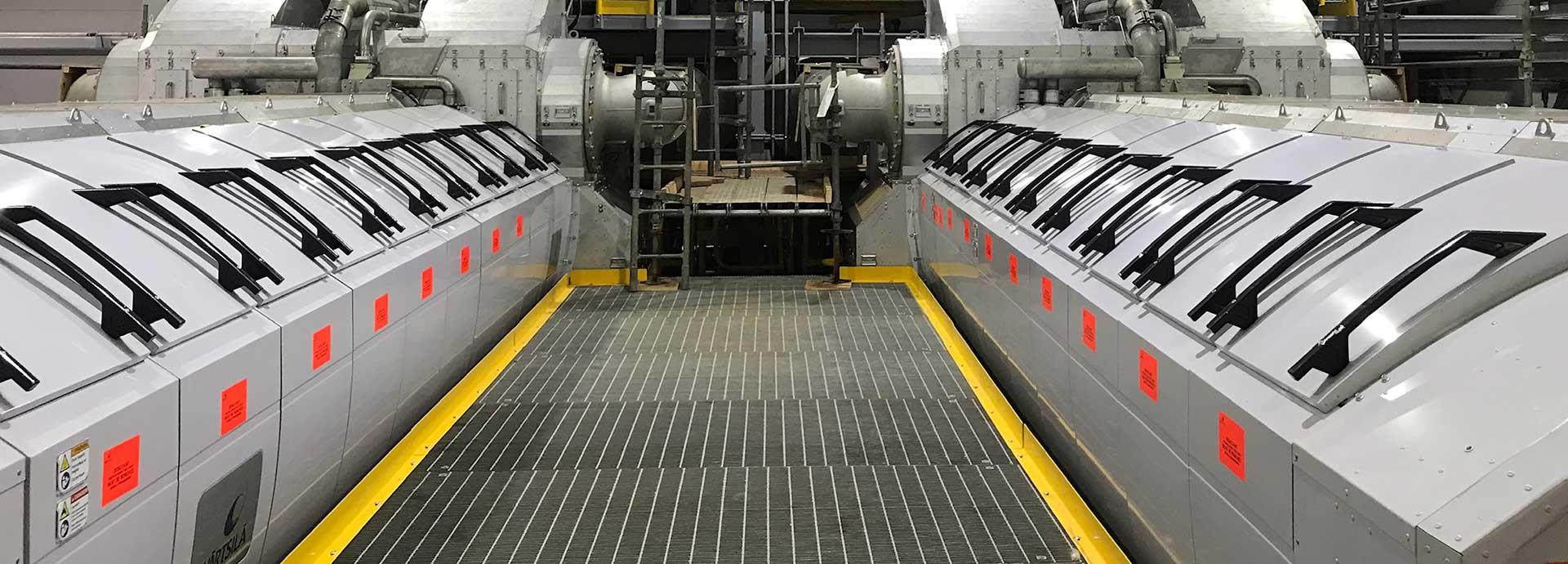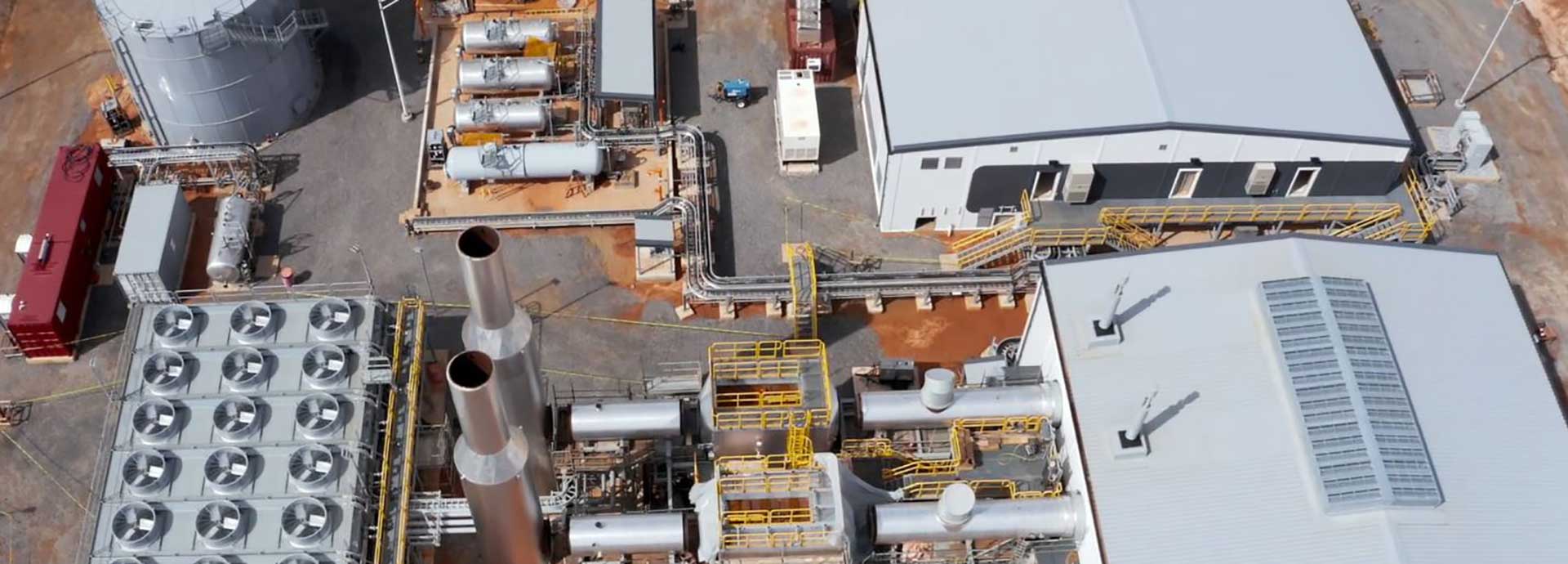

Its efficiency and reliability make the Wärtsilä 31SG the engine of choice for utilities that are transitioning to renewables. The case of Cooperative Energy in Mississippi is one such example, allowing for flexible generation to support solar power, as well as resiliency in case of hurricanes.
The US state of Mississippi has memorable weather. Summer is defined by hot sunshine. Hurricane season is defined by – you guessed it – hurricanes. This weather plays a vital role in Mississippi’s energy system and was on top of the agenda when Cooperative Energy began to talk to Wärtsilä about upgrading their Benndale plant.
Cooperative Energy is a not-for-profit, member-owned electric cooperative covering 432,000 homes and businesses in Mississippi. In 2005 coal produced more than half of their energy, but today cleaner natural gas makes up about two-thirds of the mix. Cooperative Energy also has six solar sites, showing the increasing importance of Mississippi’s sunshine in providing power.
Not just about the product, but the people behind it
“There is a lot of variable generation in our market, such as our 52 MW solar plant,” says Jim Compton, President Emeritus of Cooperative Energy. “We need to match variable generation with more flexible capacity which can rapidly start up when needed. Wärtsilä’s generation units meet this need. The 31SG engines are top-of-the-line.”
Cooperative Energy chose the Wärtsilä 31SG engine to upgrade the Benndale plant. The gas-driven engine can provide simple-cycle efficiency levels in excess of 50%, compared to about 40% with modern gas turbines. It is also able to respond rapidly to continuously changing load patterns found in systems with intermittent solar and wind energy.
“I wanted to be satisfied with the technology and the people behind it, so we visited Wärtsilä’s factory and testing facilities and met the engineers,” Compton says. “This is not just
about a product, but the people. I needed to be comfortable with everyone involved in design, installation and maintenance. I was very impressed.” The Wärtsilä 31SG engine's efficiency and reliability make it the engine of choice for utilities that are transitioning to renewables.
The Wärtsilä 31SG engine's efficiency and reliability make it the engine of choice for utilities that are transitioning to renewables.
Efficiency and flexibility are essential
Wärtsilä is delivering a 22.7 MW engine power plant under a full Engineering, Procurement and Construction (EPC) contract to Cooperative Energy.
The two Wärtsilä 31SG engines at the Benndale plant will be used as peaking units with frequent cycling. Their ability to act as fast, flexible and reliable support for renewables was an important contributor to their choice for the plant.
“The 31SG engine is highly efficient, has higher availability, produces fewer emissions and has longer maintenance intervals,” says Toni Haarala, Project Manager at Wärtsilä. “It can start and stop several times a day which is essential to support renewable energy. It provides flexibility for the future expansion of renewables for Cooperative Energy.”
The world is moving towards a 100% renewable energy future, yet it is a known fact that renewables are highly weather dependent. The solution to solve this challenge can be advanced energy storage solutions and engine power plants. If clouds obscure the sun and the production of solar energy drops, we need to have flexible and fast-starting engines such as the Wärtsilä 31SG to fill the need.
“With the modular design the customer has the ability for easy expansion for future requirements,” Haarala explains. “If they need more power in the future, we could easily put in two more units without any major effort by extending engine hall, and adding engines and auxiliaries, almost like plug and play.”
“Wärtsilä’s philosophy is to support customers’ journey to a 100% renewable energy future by delivering flexibility and reliability with an efficient solution. This enables the customers to lower energy costs. Another corner stone in this philosophy is being with the customer throughout the lifecycle of the installation to make the most of it,” says Dan Shelledy, Senior Business Development Manager in Wärtsilä Energy Business.
After the project has been fully handed over to Cooperative Energy by Wärtsilä,
the partnership between the two organisations will continue via a ten-year service agreement covering maintenance of the Wärtsilä 31SG engines and related auxiliary components. This lifecycle solution includes all scheduled maintenance
activities, spare parts, condition-based monitoring, and response time guarantees should an unscheduled event arise. “By having lifecycle support and services from Wärtsilä, Cooperative Energy can focus on their core business with
the knowledge that the Benndale plant will be available to operate when needed and that all covered equipment has been maintained to ensure the power plant performance,” Shelledy concludes.
Keeping a clean and safe worksite
Yet Wärtsilä did not simply sell Cooperative Energy two new engines with maintenance for the next ten years to come. Wärtsilä engaged in a full EPC agreement to oversee the entire project.
“Wärtsilä’s EPC contract has gone very well,” says Trey Cannon, Director of Generation Projects at Cooperative Energy. “They started on site in February 2019 and were delayed by heavy spring rains, but they’ve overcome that challenge and made up some time. We’re still well ahead of the guaranteed delivery date and I appreciate the way Wärtsilä set such an ambitious schedule.”
Cannon says that he is pleased that the private landowner next to the site has had no complaints about the work being done next door.
“It’s a clean and safe site,” Cannon says. “We’ve had about four first aid incidents, one of which was a wasp sting while another
was a strained muscle. That really is a pristine safety record if you think of a job with 100,000 man-hours.”
Resiliency in extreme weather
The Benndale plant can help support and complement the energy produced by Mississippi sunshine, but it also has to deal with less pleasant weather: hurricanes.
“Reliability and resiliency are extremely important for our system, particularly when it comes to responding to hurricanes,” says Nathan Brown, Chief Operating Officer of Cooperative Energy. “The Benndale plant is in the southern part of our system and twice it had to restore critical loads in the area, after Hurricane Frederic in 1979 and after Hurricane Katrina in 2005. After Katrina, Benndale provided services to hospitals and other critical loads in the area for several days before energy was restored.”
This leads to another benefit of the project: the ability to ‘black start’, or start with no power to the grid. The Benndale plant can carry out initial energisation of sections of the network so it can provide power to critical local infrastructure like hospitals and communications.
“We not only looked for reliability, quick start, efficiency and good operational flexibility, but we also needed black start capability,” Brown says. “Wärtsilä meets all our needs, which is important both for us and our community.”
Did you like this? Subscribe to Insights updates!
Once every six weeks, you will get the top picks – the latest and the greatest pieces – from this Insights channel by email.
